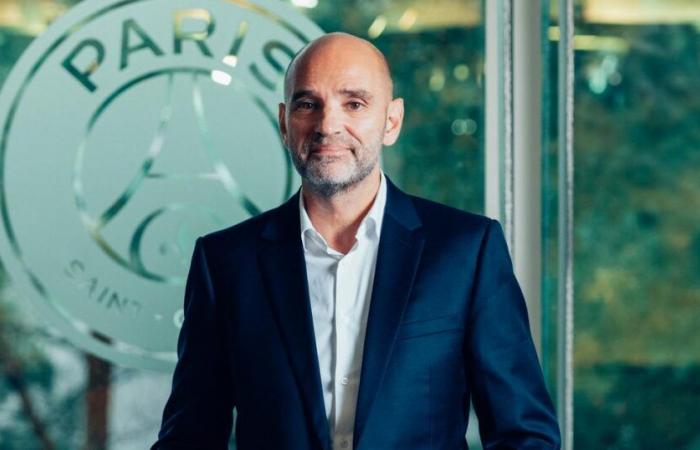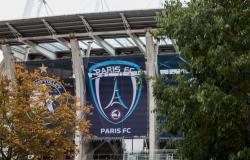A CDES study deciphers the economic impact of the club and analyzes “the social utility of PSG” in Île-de-France.
As in 2021, PSG requested the Center for Sports Law and Economics (CDES) to carry out a study on “the economic impact and social utility of the (club)” in Île-de-France for the 2023-24 season. Titled “A Club serving its territory”said study highlights “the strength of Paris Saint-Germain’s local roots”.
Over the past season, the capital club generated a turnover of €805.9 million, a record in its history, including €168.5 million in matchday revenue (x7 since the takeover of QSI in 2011). and €281.9 million in commercial revenue (x25.6 since 2011). Objective for 2024-25? An increase of 5%, despite the drop in TV rights, and a return to balance “at the latest in the next two seasons”as indicated by the new general director of the club, Victoriano Melero, during a press conference organized this Monday morning at the Parc des Princes.
Also read
“The position has not changed”: in conflict with Paris town hall, PSG remains on its line for the Parc des Princes
Third largest turnover in Europe
Note that this turnover, the third over the past season at European level, was multiplied by 8.5 between 2011 and 2024, the strongest increase in Europe over the period. The fruit of the diversification and development of income implemented by the Parisian management. The club aims to pamper its current partners, find others and focus on digital, particularly to target the United States. In the meantime, PSG is valued at 3.9 billion euros according to Forbes (7th) and the value of the brand amounts to 1.208 billion euros according to Brand Finance.
In short, PSG is doing well economically, thank you for him. And this despite a stadium in which it is now cramped. In any case, this benefits the region. Certainly, PSG has established itself as “one of the leading international sports franchises” more “a large part (of its) activities benefits the local economic fabric. The study thus demonstrates that the club constitutes an important contributor to the local economy.. Clearly, Paris-SG brought €243 million to the local economy, €194.4 million in primary economic impact (direct effects) and 48.6 million in secondary economic impact (indirect and induced effects).
An interesting number: 2379. “The number of annual full-time equivalent jobs supported by Paris Saint-Germain during the 2023/2024 season. The club has a total of 746 direct jobs. Its activities also support 291 jobs indirectly and 1,342 jobs indirectly. Due to the nature of the club's activities, the vast majority of these jobs cannot be relocated.we decipher in the CDES study, adding that “Paris Saint-Germain mobilizes 3,200 people on average on match nights at the Parc des Princes”.
When we look at the finance bill, I think it is not impossible that Paris Saint-Germain's tax contribution will increase in the weeks or months to come…
Furthermore, the amount of PSG's contributions to public finances amounts to €371 million over the past season. The club is “at least as much a contributor as CAC 40 companies”assures Melero, recalling that PSG is a “non-relocatable labor company. By definition, all PSG employees live in Paris or Ile de France. And when we look at the finance bill, I think it is not impossible that Paris Saint-Germain's tax contribution will increase in the weeks or months to come.he slips into a smile.
Of these €371 million, 208 come from employer contributions, 17 from taxes paid to the State and local authorities and 146 from taxes paid by players. “Since the arrival of QSI at the head of Paris Saint-Germain, the contributions of the club and its stakeholders to public finances have amounted to €2.9 billion. This amount is up 61% since 2021”points out the study. In 2018-19, this contribution to public finances amounted to €207 million. That’s an increase of 44%.
Also read
“It’s always good to have emulation”: CEO of PSG, Melero delighted with the change in dimension of Paris FC
Education, inclusion and transmission
Last but not least, the study aimed “to analyze and promote the social and civic actions deployed by the club, which position it as a responsible and committed actor”.
The objectives? “Education, inclusion and transmission”summarizes Fabien Allègre, vice-president of PSG For Communities, defining PSG as “the youngest of the major European clubs, it is therefore natural to turn towards young people due to our positioning. PSG for communities (which claims more than 300,000 young people supported and €3.1 million in budget, editor's note) has focused on five projects for three years, “Come on girls”, “red and blue school”, “11 of legend” and “solidarity canteen”, with a food distribution for 2,500 students at the Parc des Princes on November 16, as well as aid to a refugee camp in Bangladesh”. Sport, but not only that.






